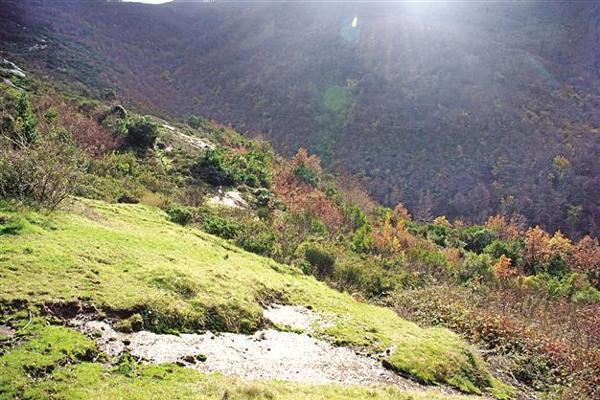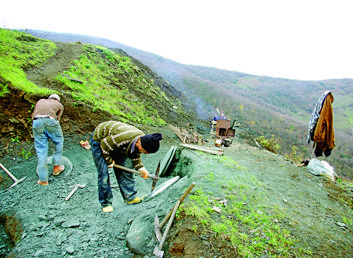Profession of kitchen art on hills of Amasra
Wilco van Herpen ISTANBUL - Hürriyet Daily News


Stone grill plates is a handcraft only found in Amasra area of the Black Sea because of the special kind of rocks in the area. Photos taken by Wilco van Herpen
How many times have you witnessed something which you thought you might not see again? This has happened to me several times. I remember the time that I went to the Black Sea province of Amasra. It was the kind of weather we are experiencing at the moment; a lot of rain and snowfall in Turkey and I was in Amasra for another episode of “Wilco’nun Karavanı.” We shot the famous Amasra salad, went to a shipyard and took a tour on a boat that sailed us along the coastline and through the narrow passage of the mainland and an island that is connected to Amasra with a small beautiful old bridge.But the highlight of the trip was a profession I never thought existed.
To put it very bluntly, I was watching people carve stone grills. But that is definitely not nice and rather disrespectful to say. What those people were doing was art, kitchen art.
Last people doing stone job
It was raining that day and I drove my camper for about half an hour into the hills near Amasra. The road ended, I parked my camper and had to walk another 20 minutes to reach the stone quarry.
Because of the rain the mountains were muddy, slippery and therefore difficult to climb. The soil was squishy because of the socked water. With every step I took the mud was sucking my boots deeper into the ground. Who can work under those kinds of circumstances every day here in those mountain I wondered. Finally, after a difficult half-hour-long walk up the mountain I reached the stone pit. In truth, it was nothing more then a kind of wall cut out in the slopes of the mountains.


Unfortunately, hardly anyone cooks food on these stone plates today and so the work slowly becomes less and less in demand. Another problem was that they did not have anyone who wanted to continue with this profession as it hardly brings in money. It takes them four hours to make a stone grill plate and the price they get for it is hardly enough to survive from.
The handicraftmen returned to their work and I saw how they were fighting the elements. No modern electrical drills, all of it was human force and know how. The work goes as follow; they would try with their pickaxes different parts of the mountain until they found a suitable stone ain that could give them the quality of stone that they require to make those stone grills. Then slowly, circle-by-circle they would carve circle shaped pieces of stone, approximately 4 centimeters thick out of that rock and hand it over to the third guy. He would work on the rough-cut stone plates until he would have a beautiful round equal stone plate. This plate had to be dried in an oven at the perfect temperature otherwise this fragile stone will break.
Ready for kitchen
After drying the stone it is ready for use in the kitchen. In the old times a lot of people from the Amasra area would prepare their food on those stones, but since most people now use gas or electricity in their homes sales have gone down considerably. But this method of preparing food is so different and so tasteful. As proof one of the men made a campfire, put the stone in the middle and waited until it was hot enough to use. With just a couple of drops of olive oil he started to prepare our lunch; sucuk (a kind of spicy garlic sausage).
The taste was really incredible compared to sucuk prepared in a pan. Carefully, slowly and with one big stone grill plate in my hands I returned to my car. It was a strange feeling to see a part of cultural history struggling to stay alive in the 21st century. Turkey might be a strange or difficult country for a lot of people, but once more I felt I had made the right decision to move to here. Where else can you find those rich traditional professions?
